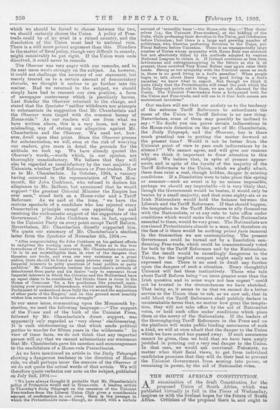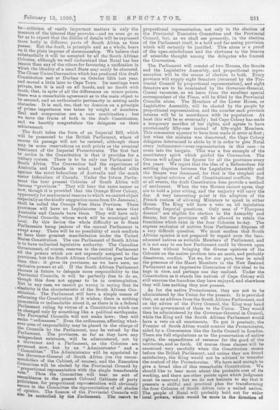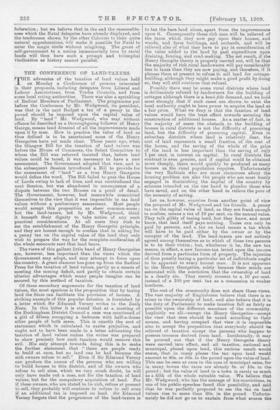THE SOUTH AFRICAN CONSTITUTION.
AN examination of the draft Constitution for the proposed Union of South Africa, which was published virtually in full in the Times of Wednesday, inspires us with the liveliest hopes for the future of South Africa. Criticism of the proposal there is, and ought to be—criticism of vastly. important matters is only the measure of the interest they provoke—and we even go so far as to expect that the dislike of details will be expressed more hotly in different parts of South Africa as time passes. But the draft, in principle and as a whole, bears on it the plain impress of statesmanship. We believe that substantially it will be accepted by all the South African Colonies, although we well understand that Natal has less te,asou than any of the others for favouring a unification in which the identity of a small State may easily be obscured. The Closer Union Convention which has produced this draft Constitution met at Durban on October 12th last year, and moved a little later to Cape Town. Its meetings were private, bet it is said on all hands, and no doubt with truth, that, in spite of all the differences on minor points, there was a remarkable agreement as to the main object to be secured, and an enthusiastic pertinacity in setting aside obstacles. It is said, too, that no decision on a principle of prime importance was taken by weight of numbers. Zeal and compromise are a rare combination ; but we have the fruits of both in the draft Constitution, and we heartily congratulate the delegates on their achievement.
The draft takes the form of an Imperial Bill, which will be presented to the British Parliament, where of course its passage will not be resisted, although there may be some reservations on such points as the eventual treatment of the Imperial Protectorates. The first fact to notice in the Constitution is that it provides for a unitary system. There is to be only one Parliament iu South Africa. The Convention had the experiences of Australia and Canada in mind, and it decided alike against the strict federalism of Australia and the much easier federalism of Canada. Under the future Parlia- ment the four present Colonies of South Africa will become "provinces." They will bear the same names as now, though it is provided that the Orange River Colony, apparently for sentimental reasons to which we cannot object (especially as the kindly suggestion came from Dr. Jameson), shall be called the Orange Free State Province. These provinces will have no Legislatures iu the sense that Australia and Canada have them. They will have only Provincial Councils, whose work will be municipal and local. By this device the whole difficulty as to State Parliaments being jealous of the central Parliament is swept away. There will be no possibility of such conflicts as have their greatest manifestation under the United States Constitution. The one Parliament of South Africa is to have unlimited legislative authority. The Canadian Government, of course, reserves to the central Parliament all the powers which are not expressly assigned to the provinces, but the South African Constitution goes farther than this : it gives its provinces, as we have seen, no exclusive powers at all. If the South African Parliament chooses in future to delegate more responsibility to the Provincial Councils, it will be perfectly free to do so, though this does not appear to be in contemplation. But in any case, we cannot go wrong in saying that its • eleeticity is the characteristic of the South African Con- stitution. The Parliament will have a simple means of reforming the Constitution if it wishes; there is nothing Immutable or indissoluble about it, as there is in a federal Parliament ruling by virtue of a Constitution which can be changed only by something like a political earthquake. The Provincial Councils will not make laws ; they will make "ordinances." Even the ordinances, affecting what- ever area of responsibility may be placed in the charge of the Councils by the Parliament, may be vetoed by the Parliament. The provinces, so far as they have any independent existence, will be administered, not by a Governor and a Parliament, as the Colonies are governed now, but by an " Administrator " and a Committee." The Administrator will be appointed by the Governor-General of South Africa (on the recom- mendation of the Cabinet, of course), and the Executive Committee will be elected by the Provincial Council by
11
proportional representation with the single transferable vote." Thus the Committee will bear no sort of resemblance to the present Colonial Cabinets of party politicians, for proportional representation will obviously secure in the Committee the representation of all shades of opinion. The finance of the Provincial Councils will also be controlled by the Parliament. The reeorb to proportional representation, not only in the election of tie Provincial Executive Committee and the Provincial Council, but, as we shall see presently, in the election of the Parliament itself, is a bold and far-seeing provision which will certainly be justified. This alone is a proof of the open-mindedness and the alertness to the lessons of scientific thought among the delegates who framed the Convention.
The Parliament will consist of two Houses, the Senate and the Legislative Assembly, and proportional repre- sentation will be the means of election to both. Every province will supply eight Senators (returned by the Pro- vincial Council by proportional representation), and eight Senators are to be nominated by the Governor-General. Casual vacancies, as we learn from the excellent special correspondent of the Times, will be filled by the Provincial Councils alone. The Members of the Lower House, or Legislative Assembly, will be elected by the people by proportional representation, and the number each province returns will be in accordance with its population. At least this will be so eventually; but Cape Colony has made a temporary sacrifice of her rights, and agrees to have provisionally fifty-one instead of fifty-eight Members. This concession appears to have been made in error at first ; but when the mistake was discovered, the Cape Colony delegates determined to abide by it in order to give Natal every inducement—over-representation in this case—to come into the bargain. This was a fine example of the conciliatory spirit which guided the Convention. The Census will adjust the figures for all the provinces every five years. We regret that the idea of a Referendum for settling disputes between the Legislative Assembly and the Senate was dismissed, for that is the simplest and most logical solution of all Constitutional conflicts. But at all events, the draft Constitution does provide a method of settlement. When the two Houses cannot agree, they are to hold a joint sitting, and the majority will carry the day. A very interesting point is the adoption of the French custom of allowing Ministers to speak in either House. The King will have a veto on all legislation affecting Imperial questions. Only men of "European descent" are eligible for election to the Assembly and Senate, but the provinces will be allowed to retain the franchises which exist in the four Colonies to-day. The express exclusion of natives from Parliament disposes of a very difficult question. We must confess that South African opinion is not prepared to regard even the best- educated natives as suitable Members of Parliament, and it is not easy to see how Parliament could be thrown open to them without bringing the diverse opinions of the Colonies on the native problem into an acute, and probably disastrous, conflict. Yet we, for our part, bear in mind the presence of the Maori Members in the New Zealand Parliament as an impressive illustration of the ideal to be kept in view, and perhaps one day realised. tinder the Constitution as it stands the natives of Cape Colony will still exercise the franchise they have enjoyed, and elsewhere they will lose nothing they now possess.
As for the native Protectorates, they are not to be administered by the Union for the present. It is provided that, on an address from the South African Parliament, and on the advice of the Privy Council, the King may hand over the government of them to the Union. They would then be administered by the Governor-General in Couuoil, while the King and the South African Parliament would have a veto on all enactments. To put it precisely, the Premier of South Africa would control the Protectorates, aided by a Commission like the India Council in London. There are full stipulations as to the preservation of native rights, the expenditure of revenue for the good of the territories, and so forth. Of course these clauses will be examined very carefully when the Constitution conies before the British Parliament, and unless they are found satisfactory, the King would not be advised to transfer the control of the Protectorates. We have said enough to give a broad idea of this remarkable Constitution. We should like to hear more about the probable cost of its working, and there are other points upon which judgment must be reserved ; but we do not hesitate to say that it presents a skilful and practical plan for transforming the four Colonies of South Africa into a united nation. The people of Natal will probably hold out for wider local powers, which would -be more in the direction of federation; but we believe that in the end the reasonable- ness which the Natal'delegates have already displayed, and the tenderness shown by the other Colonies to their quite natural apprehensions, will make it possible for Natal to enter the magic circle without misgiving. The grant of self-government to a nation immemorially torn by racial feuds will then have such a prompt and triumphal vindication as history cannot parallel.











































 Previous page
Previous page